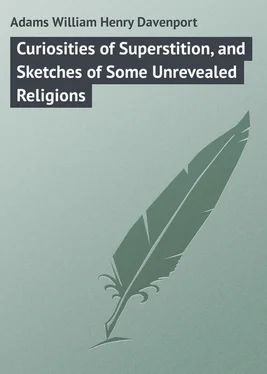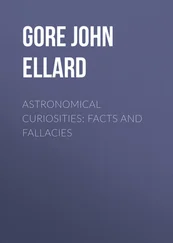William Adams - Curiosities of Superstition, and Sketches of Some Unrevealed Religions
Здесь есть возможность читать онлайн «William Adams - Curiosities of Superstition, and Sketches of Some Unrevealed Religions» — ознакомительный отрывок электронной книги совершенно бесплатно, а после прочтения отрывка купить полную версию. В некоторых случаях можно слушать аудио, скачать через торрент в формате fb2 и присутствует краткое содержание. Жанр: foreign_language, foreign_prose, на английском языке. Описание произведения, (предисловие) а так же отзывы посетителей доступны на портале библиотеки ЛибКат.
- Название:Curiosities of Superstition, and Sketches of Some Unrevealed Religions
- Автор:
- Жанр:
- Год:неизвестен
- ISBN:нет данных
- Рейтинг книги:4 / 5. Голосов: 1
-
Избранное:Добавить в избранное
- Отзывы:
-
Ваша оценка:
- 80
- 1
- 2
- 3
- 4
- 5
Curiosities of Superstition, and Sketches of Some Unrevealed Religions: краткое содержание, описание и аннотация
Предлагаем к чтению аннотацию, описание, краткое содержание или предисловие (зависит от того, что написал сам автор книги «Curiosities of Superstition, and Sketches of Some Unrevealed Religions»). Если вы не нашли необходимую информацию о книге — напишите в комментариях, мы постараемся отыскать её.
Curiosities of Superstition, and Sketches of Some Unrevealed Religions — читать онлайн ознакомительный отрывок
Ниже представлен текст книги, разбитый по страницам. Система сохранения места последней прочитанной страницы, позволяет с удобством читать онлайн бесплатно книгу «Curiosities of Superstition, and Sketches of Some Unrevealed Religions», без необходимости каждый раз заново искать на чём Вы остановились. Поставьте закладку, и сможете в любой момент перейти на страницу, на которой закончили чтение.
Интервал:
Закладка:
Mr. Deutsch gives the following account of the six sections of the Mishna: —
“Section I. Seeds : of Agrarian laws, commencing with a chapter on Prayers. In this section the various tithes and donations due to the Priests, the Levites, and the poor, from the products of the lands, and further the Sabbatical year, and the prohibited mixtures in plants, animals, and garments, are treated of.
“Section II. Feasts : of Sabbaths, Feast and Fast days, the work prohibited, the ceremonies ordained, the sacrifices to be offered, on them. Special chapters are devoted to the Feast of the Exodus from Egypt, to the New Year’s Day, to the Day of Atonement (one of the most impressive portions of the whole book,) to the Feast of Tabernacles, and to that of Haman.
“Section III. Women : of betrothal, marriage, divorce, &c.; also of vows.
“Section IV. Damages : including a great part of the civil and criminal law. It treats of a law of trades, of buying and selling, and the ordinary monetary transactions. Further, of the greatest crime known to the law, viz., idolatry. Next of witnesses, of oaths, of legal punishments, and of the Sanhedrim itself. This section concludes with the so-called ‘Sentences of the Fathers,’ containing some of the sublimest ethical dicta known in the history of religious philosophy.
“Section V. Sacred Things : of sacrifices, the first-born, &c.; also of the measurements of the Temple (Middoth).
“Section VI. Purifications : of the various Levitical and other Hygienic laws, of impure things and persons, their purification, &c.” 22 22 Emanuel Deutsch, “Literary Remains,” (edit. 1874, pp. 32, 33.)
In defence of the Haggadah, with all its incongruities, puerilities, and absurdities, it is only just to hear what Deutsch, its enthusiastic apostle, has to say. And first he applies to it the rhyming apology which Bunyan put forward on behalf of his great allegory, – which, by the way, Mr. Deutsch surely misrepresents and misunderstands when he speaks of it as Haggadistic: —
“… Wouldst thou divert thyself from melancholy?
Wouldst thou be pleasant, yet be far from folly?
Wouldst thou read riddles and their explanation?
Or else be drownèd in thy contemplation?
Dost thou love picking meat? Or wouldst thou see
A man in the clouds, and hear him speak to thee?
Wouldst thou be in a dream, and yet not sleep?
Or wouldst thou in a moment laugh and weep?
Wouldst lose thyself, and catch no harm?
And find thyself again without a charm?
Wouldst read thyself, and read thou know’st not what
And yet know whether thou art blest or not
By reading the same lines? O then come hither,
And lay this book, thy head and heart together.”
Mr. Deutsch thus seeks to disarm antagonists by a skilful concession. He does not wonder – not he – that the so-called “Rabbinical stories,” submitted at intervals to the English public, should have met with an unflattering reception. The Talmud, which has always at hand a drastic word, says of their collectors: – “They dived into an ocean, and brought up a potsherd.” But then, he says, these follies form only a small item in the vast mass of allegories, parables, and the like, that compose the Haggadah. And, besides, they are partly ill-chosen, partly ill-translated, and partly did not even belong to the Talmud, but to some recent Jewish story books. Herder – to name the most famous critic of the “Poetry of Peoples” – has spoken most eulogistically of what he saw of the genuine specimens. And, indeed, “not only is the entire world of pious biblical legend which Islam has said and sung in its many tongues to the delight of the wise and simple for twelve centuries, now to be found either in embryo or fully developed in the Haggadah, but much that is familiar among ourselves in the circles of mediæval sagas, in Dante, in Boccaccio, in Cervantes, in Milton, in Bunyan, has consciously or unconsciously flowed out of this wondrous realm, the Haggadah. That much of it is overstrained, even according to Eastern notions, we do not deny. But,” argues Mr. Deutsch, “there are feeble passages even in Homer and Shakespeare.” To this it may be replied, that in Homer and Shakespeare such passages are rare, and do not form the bulk of their writings; and, moreover, that for the Iliad or for Hamlet we do not claim the position of authority which is claimed for the Talmud.
Let us glance briefly at the cosmogony of the Talmud. It assumes that the universe has been developed by means of a series of cataclysms; that world was destroyed after world, until God made “this world, and saw that it was very good.” It assumes also that the kosmos was wrought out of some original substance, itself created by God. “One or three things were before this world, – Water, Fire, and Wind; Water begat the darkness, Fire begat light, and Wind begat the spirit of Wisdom.”
“The how of the creation was not mere matter of speculation. The co-operation of angels, whose existence was warranted by Scripture, and a whole hierarchy of whom had been built up under Persian influences, was distinctly denied. In a discussion about the day of their creation, it is agreed on all hands that there were no angels at first, lest men might say, ‘Michael spanned out the firmament on the south, and Gabriel to the north.’” There is a distinct foreshadowing of the Gnostic Demiurgos – that antique link between the Divine Spirit and the world of matter – to be found in the Talmud. What with Plato were the Ideas, with Philo the Logos, with the Kabbalists the “World of Aziluth,” what the Gnostics called more emphatically the wisdom (σοφία), or power (δύναμις), and Plotinus the νοῦς, that the Talmudical authors call Metation. There is a good deal, in the post-captivity Talmud, about the Angels, borrowed from the Persian. The Archangels or Angelic princes are seven in number, and their Hebrew names and functions correspond almost exactly to those of their Persian prototypes. There are also hosts of ministering angels, the Persian Yazatas
Конец ознакомительного фрагмента.
Текст предоставлен ООО «ЛитРес».
Прочитайте эту книгу целиком, купив полную легальную версию на ЛитРес.
Безопасно оплатить книгу можно банковской картой Visa, MasterCard, Maestro, со счета мобильного телефона, с платежного терминала, в салоне МТС или Связной, через PayPal, WebMoney, Яндекс.Деньги, QIWI Кошелек, бонусными картами или другим удобным Вам способом.
1
Miss Gordon Cumming, “From the Hebrides to the Himalayas,” ii. 226, 227.
2
Max Müller, Buddhism and Buddhist Pilgrims, pp. 5, 6.
3
Rig-Veda, i. 164, 46.
4
Rig-Veda, x. 121, by Max Müller.
5
The thought in this paragraph, and several of the expressions, are from Max Müller.
6
So in Shelley’s lyrical drama of “Prometheus Unbound:” —
7
Max Müller, pp. 13, 14.
8
Professor Wilson propounded a theory to the effect that there never was any such man as Buddha, but the theory has found few supporters.
Читать дальшеИнтервал:
Закладка:
Похожие книги на «Curiosities of Superstition, and Sketches of Some Unrevealed Religions»
Представляем Вашему вниманию похожие книги на «Curiosities of Superstition, and Sketches of Some Unrevealed Religions» списком для выбора. Мы отобрали схожую по названию и смыслу литературу в надежде предоставить читателям больше вариантов отыскать новые, интересные, ещё непрочитанные произведения.
Обсуждение, отзывы о книге «Curiosities of Superstition, and Sketches of Some Unrevealed Religions» и просто собственные мнения читателей. Оставьте ваши комментарии, напишите, что Вы думаете о произведении, его смысле или главных героях. Укажите что конкретно понравилось, а что нет, и почему Вы так считаете.












